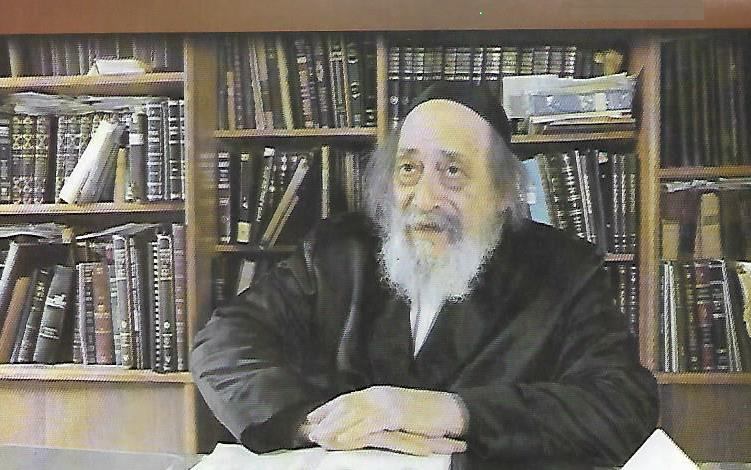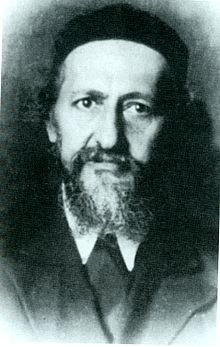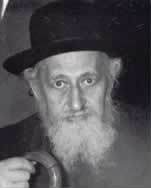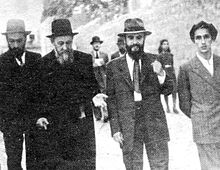9 Tishrei 5780 marks the sixtieth anniversary of the passing of HaRav Yitzchok Zeev Soloveitchik, son of HaRav Chaim Soloveitchik who served as rov of Brisk, Lithuania. His son HaRav Yitzchok Zeev took over the position from him upon his passing in 1918. HaRav Yitzchok Zeev (also known as HaRav Velvel and as the Griz) served in that position until the start of World War II when he fled first to Vilna and then to Eretz Yisroel in 1941.
The Soloveitchik family has been enormously influential in the Torah world for over a century, first in eastern Europe and later in America and Israel. They are known for their deep perception of current issues, and unwavering interpretation of the Torah in the modern world.
The Griz arrived in Eretz Yisroel as a refugee in 1941, fleeing from the flames of Europe. Just living in Eretz Yisroel presented new challenges compared to living in Europe.
Among those who were close to the Griz in the early months and years after his arrival were the Shachor family, headed by HaRav Zeev Shachor who was a relative of the Soloveitchiks. The family also included his son-in-law HaRav Eliezer Dovid Berlin, and his two sons HaRav Alexander and HaRav Chaim, all zichronom livrochoh.
HaRav Zeev Berlin shlita

A living witness to those times is HaRav Zeev Berlin, son of the abovementioned HaRav Chaim, and also the son-in-law of HaRav Aharon Leib Shteinman. The Musaf Kodesh of Yated Ne'eman was fortunate to be able to hear his recollections of those days.
Your great-grandfather HaRav Zeev greeted and helped the Brisker Rov from the time he reached Eretz Yisroel in Adar 5701.
HaRav Zev Berlin tells us carefully:
The first few days that Maran the Brisker Rov set foot in Eretz Yisroel he spent in Haifa. Maran HaRav brought with him a sack of flour that he had bought in Turkey, and from which he and his family had eaten on the way, bread and water. After he arrived in Eretz Yisroel the flour finished. (Incidentally, when he arrived in Eretz Yisroel he said that he must learn the laws of Terumos and Ma'asros anew, since they are now practically relevant, and it is not enough to rely on what we learned in Europe.)
Since the sack of flour was used up, and there was nothing to eat, his hosts asked the Rov what they could give him to eat. The Rov answered: Fish cooked in water and salt.
Can one add some oil? he was asked.
The reply was, "Oil requires terumos uma'asros, so one should not add anything besides salt and water."
The Brisker Rov as a young man

They told him that the one in charge of terumos uma'asros in the Shemen oil company happened to be the nephew of the Chazon Ish, HaRav Alfa, who lives in Haifa and if he gives his hechsher, why shouldn't the Rov use it? Nonetheless, the Rov refused.
HaRav Alfa himself paid him a visit on Shabbos and the Rov asked, "I heard that you are responsible for the ma'asros. How do you go about it?"
HaRav Alfa replied at once, "It's not for you. The Rov should not use this product."
He explained, "The Shemen company does not allow me to spill out the ma'aser oil. They prevent me from taking the tithe at their expense. In order to save the public from the prohibition of tevel, Maran [the Chazon Ish] made allowance to continue as follows: to pour out a little from the ma'aser rishon so that it be less than one percent and then pour back the remainder into the oil tanks and make a bitul berov. This is only a bedi'eved measure. I am not the boss and this is the only way to prevent ignorant Jews from sinning. And this is how it is done."
Maran turned to them and said, "You see that even though he is the Mashgiach, we shouldn't have allowed ourselves to eat, so long as he said that [his supervision] was not for us."
We heard that there were times from the Brisker Rav ate without asking questions, even though he was so stringent in every iota.
HaRav Zev smiled and commented: "True, after he visited Haifa, he went to Yerushalayim and remained in the Babad Hotel until a suitable apartment was found shortly after. My grandmother, Rebbetzin Berlin, cooked all of his food and he ate it without questions."
Her son, my father HaRav Chaim Berlin, and also his brother- in-law HaRav Eliyahu Chaim Shapira, would bring the food she had prepared for the Rov and the family. One would bring it and the other would bring the dishes back. This was done every day, from Yemin Moshe [where Rebbetzin Berlin lived] to the Rov's residence, back and forth.
I heard from Mori Verabbi HaRav Dovid Soloveitchik that he once asked his father how it could be that he ate what was put before him without asking any questions? He ate my grandmother's food without asking any questions regarding how it was prepared and what the food was made of. This is a very strong question for anyone familiar with the ways of the Griz.
I stress further that the Rav made aliya in Adar and settled in Yerushalayim. Before Pesach, he came to the Yemin Moshe neighborhood to see how they drew the customary mayim shelonu water for matzo baking, sufficing with this and not entering any further into the matzo baking. He received matzos and ate them. (Incidentally, this was the source of the custom to bake matzos on motzei Shabbos, not because the Rav of Brisk ask that it be so but because my zeide, HaRav Zev Shachor, baked on motzei Shabbos and Maran joined this chabura group which baked specifically on motzei Shabbos.)
Maran answered HaRav David, "Before World War I, my father (HaRav Chaim) once said to me that we have a relative in Eretz Yisrael, who is called Rav Zev Shachor, and by him one could eat. He does everything like we do. I didn't know why he said this to me at the time. [Who thought then about Eretz Yisrael?] But since Abba said this, I ask no questions."
HaRav Zev notes:
People think that the Brisker Rav was a machmir arbitrarily but we see that he examined everything because it needed inspection. Similarly, when he went to Bnei Brak in 5708. He asked the Chazon Ish upon which shochet he could rely. The Chazon Ish replied that one could rely upon R' Nosson Shochet, who worked under HaRav Landau. This was all the Brisker Rav needed to know and asked no more. After that, all the years they sent him meat which was slaughtered in Bnei Brak by that particular shochet.
When Maran was informed that my grandfather HaRav Zev Shachor was on his deathbed, he went to Yemin Moshe to be present at the ascent of the neshamah. He waited many hours by his bedside but had to return home. (HaRav Zev passed away only on the morrow.)
It is well known that the Brisker Rav refused to accept any money or favors from others, even for his own basic needs.
It is true that he did not generally take money from people, by he made an exception for some people from his home town, Brisk, from whom he did accept money.
The Brisker Rov

My father told that once one of the Zionist leaders, a native of Brisk, met him and he said that he had heard that one could give him [my father] money for the Rov. My father did not want to take any money from him and suggested that he go to the Rov in person since he came from Brisk.
The Zionist said he felt uncomfortable doing so. My father held out and did not take any money from him and when my father related this to the Rov, Maran said with satisfaction, "And did you really imagine that I would take anything from him?"
On the other hand, there certainly were distinguished men from Brisk who came to Eretz Yisrael before the war or long before us, and became his confidantes, aside from others who assisted him in communal matters (like Rabbi Yisrael Shenker zt"l and others).
One of them was a prominent Yid, Reb Moshe Gewirtzman, right?
I actually had him in mind as an example. He was in Brisk even in the time of the Beis Halevi and then in the time of HaRav Chaim, and he immigrated to Eretz Yisrael, settling in Tel Aviv. He was the one who publicized the notice of the Vaad Hayeshivos in 5701, "A Lion Has Come Up from Bovel."
He helped the Brisker Rav very substantially. He came from Tel Aviv and used to sleep by us in Yemin Moshe so as to be of service to the Rov. He was an elderly Jew and very precious. The Brisker Rov held Reb Gewirtzman in high esteem.
HaRav Zev continues.
I once heard Reb Moshe tell that in his youth, he was somewhat close to the Beis Halevi. The Beis Halevi never prayed together with a minyan, even if there was one in his house, but he would pray in an adjoining room, not leaving it.
R' Moshe said that he wondered a great deal about this. Once, he noticed that the door to the room was a bit ajar. Being the only one in the house at the time, he decided to enter and hide under the bed so as to watch while the Beis Halevi davened mincha.
R' Moshe said, "The Beis Halevi hardly moved during the prayer but one could easily have soaked up three towels from the perspiration and tears he shed. At that time I understood that such a tefillah could not be davened with a minyan!"
Rav Zeev then tells what he heard from his father:
The Tchebiener Rov once knocked on the door of the Brisker Rov. My father and Reb Moshe Gewirtzman were there. My father was in the room with the Rov and Reb Moshe outside. Reb Moshe opened the door and told the Tchebiener Rov that the Rov would finish shortly. Reb Moshe went back in to the Rov and continued to talk with him. The Tchebiener Rav sat down in the hall by a small table.
Suddenly the Rav emerged from the room and saw the Tchebiener sitting and waiting. He was taken aback and exclaimed, `Tchebiener Rov!' and embraced him. He turned to Reb Moshe and shouted, `What a disgrace! Here I was inside, talking, and the Rov was sitting and waiting! I am so ashamed!' My father said that he had never heard the Brisker Rav raise his voice so loudly and with such pain! All the more so, against Reb Moshe.
My father told me another vignette about the Tchebiener:
During one of the battles which the Brisker Rov engaged in, he sent my father with a public letter to the Tchebiener for his signature. My father first began describing the issue to him when the Rov interrupted and said, `I see you have a paper in your hand. Can you give it to me?'
My father gave it to him and, without even reading its contents, the Rav took a pen and affixed his name to it under that of the Brisker Rov (in order to show his utter deference to the Rov, by signing without any judgment of his own).
After that he said to my father with warmth, "But what I just did does not have the force of a signature, since I had not seen what was written there. Now, I will look at what it says."
He read it over carefully and patiently, and then he took the pen again and went over his signature.
*
Klal Yisroel was in awe of the Brisker Rov. My father-in-law (HaRav Shteinman) once told me, do you think that there was even one godol beYisroel, that among those who surrounded him, there were not some who tried to fool him? And not just those who were constantly around him, but also those who went in and tried to fool him. This happened to HaRav Chaim Ozer and also to the Chazon Ish. But with regard to the Brisker Rov there was such an awe of him and such fear that they tried the least of all to fool him. He was careful in his wording: It was not that they did not try, but it was the least.
The Brisker Rov with his sons

*
When the Chazon Ish agreed to meet with prime minister Ben Gurion there was some opposition, even to the extent that some prepared posters written in a degrading fashion against Maran the Chazon Ish. They relied on the fact that the Brisker Rov had refused to meet with the prime minister and they thought that this allowed them to come out against the Chazon Ish. They did not manage to put up the posters before Shabbos, and they planned to do so motzei Shabbos.
In the course of the Shabbos, the Brisker Rov found out about the plan. When Rav Amram Blau came to daven ma'ariv at the end of Shabbos, the Rov said to him that he had heard that people were planning to put up posters. Rav Amram said that he did not know much about the matter.
The Rov said very distinctly: "We will not daven ma'ariv until all the posters are here, in this house." [The Rov understood that Rav Amram knew who was involved.]
Rav Amram had no choice and he went out and came back with two other men who brought in all the posters. [They say that Maran HaRav warned them that if they put up posters he will issue a letter against them and in support of the Chazon Ish.] The Brisker Rov was very upset and pained by the chutzpah.
The general opinion is that Maran HaRav refused to meet with him, but the Chazon Ish saw fit to do so because of the problem of giyus bonos.
I do not know the details why he refused and why the Chazon Ish met with him. Who are we to understand these delicate issues that are the province of the Cedars of Lebanon. I will just tell you what I heard from by father zt"l who heard this from the Rov zt"l himself.
Mr. Navon, who was a senior assistant of the prime minister, came to the Rov to ask him to receive the prime minister. Maran HaRav was sitting, and suddenly he realized that a limousine had stopped outside (hearing the noise of the brakes), and he understood that a public figure had arrived to see him. He called loudly to his daughter: "Rivka (Rebbetzin Schiff) close the door."
A minute later there was knocking at the door. At first they did not open the door. But they kept on knocking and knocking until Maran HaRav said they should open. Standing in the doorway was the senior assistant Mr. Navon, and he said that the prime minister would like to meet with the Rov.
Maran HaRav avoided a direct reply and said that he was not well and cannot receive people. The other replied that there is no problem, the prime minister will wait until the Rov is stronger. Maran HaRav said that due to his weakness, he cannot relate properly to such people. Mr. Navon replied that no offense would be taken if he did not relate properly. This went on for some dozen excuses and replies. For example Maran HaRav said that he speaks Yiddish and not his language. Mr. Navon said it is not a problem and the prime minister will speak Yiddish. And so on. Until Mr. Navon asked: "These are all excuses. What is the real reason the Rov does not want to meet?"
Maran HaRav answered: Al tisvada loroshus. (Do not make yourself known to the authorities.)
Navon answered: "Not to make yourself known to the authorities refers to a non-Jewish king, not to a Jewish king."
Maran HaRav answered: "That is what you say. But I say to you otherwise."
(Incidentally, my father asked Maran HaRav for his source that it includes Jews, and Maran HaRav immediately opened up the Peirush Mishnayos of the Rambam who applies it to those who made themselves known to Ach'av, a Jewish king, and who were punished.)
What did Maran HaRav tell this to my father? Because when my father went to see Maran HaRav later that day he found him a little upset. He said to my father: Tomorrow Rabbi Lawrence will file a parliamentary question in the Knesset, and there could be problems because I refused to meet with the prime minister. (Then he told my father about what had happened as told above.) After some thought, he asked my father to call Rabbi Lawrence.
Maran HaRav told Rabbi Lawrence something that seemed very cryptic: "Tomorrow when you file the parliamentary question, if the prime minister says to you, Al tisvada loroshus, don't be surprised and just keep on going."
And that is what happened. Rabbi Lawrence filed the question, and the prime minister said with derision, Al tisvada loroshus.




